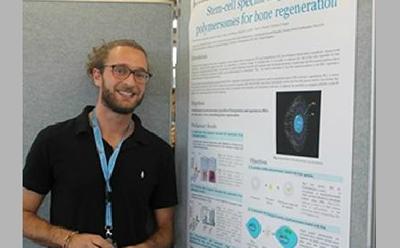Improving drug treatment to help bones heal better, innovative research could change lives

Institute for Life Sciences (IfLS) postgraduate researcher Edoardo Scarpa is trying to find out how to help people to recover faster and better after breaking their bones. His interdisciplinary PhD project, involving techniques from both biological sciences and medicine, is examining how the human body can be encouraged to heal itself more effectively through innovative drug treatments delivered directly to the target area.
Edoardo came to the University of Southampton from Italy. Growing up in Gallipoli, a small resort in the south of the country, he soon realised he had a passion for science. His bachelors degree in biotechnologies at the University of Salento was followed by a Masters at Parma where a module on biomaterials and tissue regeneration incorporating stem cells caught his imagination. Applying for PhD opportunities he was impressed by the project on offer at IfLS, especially its interdisciplinary nature. “The way we work at Southampton is just awesome,” he declares. “I remember my supervisor at Salento always told me that science is changing radically. The old divisions between the subjects are disappearing and we need to work collaboratively if we are to achieve real breakthroughs.”
Every year, up to two million people in the UK fracture a bone, up to half of them find it does not heal properly. While drugs exist to boost the healing process, many have side effects. Edoardo is looking into how to embed drugs in tiny polymer particles, each one thousand times smaller than the diametre of a human hair, so they can be delivered to the right place to encourage the cells’ signalling mechanisms to work better. At Southampton, he has enrolled on an integrated PhD programme within Medicine, spending the first year on three different laboratory projects before specialising for the rest of the programme; his supervisors are Dr Nick Evans, Dr Tracey Newman and Professor Richard Oreffo.
Effective science communication is another of Edoardo’s interests. He was selected from thousands of applicants from universities throughout the country to present a poster explaining his PhD to MPs and other Parliamentarians at the annual Science Engineering and Technology (SET) for Britain event at Westminster. “I met city MP Alan Whitehead at the event and it was a tremendous experience in outlining my research to non-scientists.” He has also taken part in the University’s popular summer roadshow, taking practical science to young and old alike around the country and demonstrating how to extract DNA from strawberries.
Although Edoardo is aiming high in his career, he is also reaching for the heights in his spare time. He is the enthusiastic co-captain of Southampton’s basketball team which has just missed out on promotion to the universities’ first division: “Getting involved in sport helps you make connections with students from outside your specialism, it’s another kind of interdisciplinary activity.”